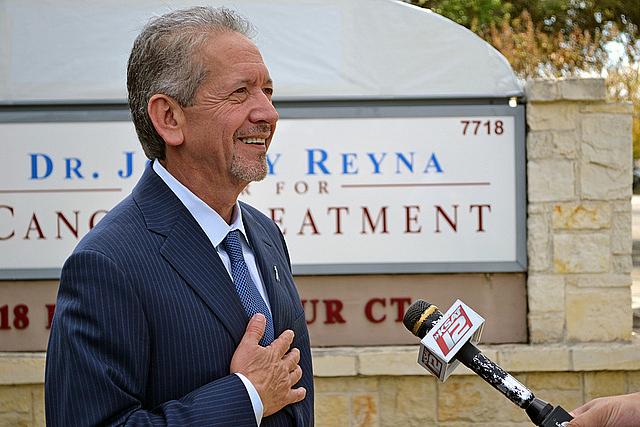Check’s in the Mail: Why you shouldn’t count your donation until it’s banked

A donor speaks to the media after a treatment facility is named in his honor.
You’re a hospital CEO, and your Monday is looking great. Dressed for success, you put on a hard hat to complete the look of a leader ready for the next big thing.
That big thing is a new hospital wing. You, the mayor, and a trusted donor cut the ribbon at a site that used to be a 1950s office building. In three years, it will be the Kyrgios Center for Childhood Cancers. You’ve spent $20 million already on the deconstruction and site preparation and are awaiting another $80 million from the Kyrgios family.
The rest of the week, you are flying high. You’re taking calls from reporters and going out for lunch every day with a new local business leader.
On Friday, though, you get a call that derails everything. The Kyrgios family has had a change of heart – and finances. They had a lot of money invested in European markets, and the Greek financial meltdown has hit them hard.
For health care organizations and nonprofits focused on health, this is all too real. And navigating it can prove difficult in the extreme. Stuart Pfeifer recently wrote in the Los Angeles Times about the Saint John’s Health Center Foundation suing a donor, Paula Kent Meehan, after she failed to fulfill a multi-million dollar donation pledge. Pfeifer wrote:
Meehan died last year at 82. She originally promised the money in 2007 to the foundation, which says it supports the hospital's "mission of compassionate care" and funds cancer research. To recognize that gift, St. John's planted a tree on its grounds in Meehan's honor and put her name in the hospital lobby along with other big donors. After her death, the foundation wrote to Meehan's representatives and demanded the money. When they refused to pay, the foundation sued the executors of her estate for breach of contract for $5 million.
Over multiple posts, I’m going to explore how a dream donation can lead to a nightmare of legal fights, busted reputations, and major setbacks for health initiatives aimed at improving patients’ lives.
Get it in writing. One of the things that St. John’s has going for it is a written contract, of sorts, with Meehan. She signed what is known as an "estate pledge commitment" that made the donation pledge "legally binding on me and my heirs, executors, administrators, personal representatives and assigns." But note that even the phrase “legally binding” may not have the heft you want it to. As Sally Beatty and Vauhini Vara at The Wall Street Journal wrote:
A gift agreement isn't foolproof. Even if it contains the phrase ‘legally binding’ it could be challenged later in court by heirs or a donor's estate, says Victoria B. Bjorklund, a partner with Simpson Thacher & Bartlett LLP in New York.
Keep your promises. Elton John was raising money for the Elton John AIDS Foundation and used a carrot that would certainly lure a number of celebrity gawkers and music fans. He offered to take big donors on a date with him and his partner David Furnish, according to the Daily Mail in London. Spencer Lodge agreed to donate about $1 million in exchange for the date. Stephen Hull at the Daily Mail wrote:
But the date never happened because Mr. Lodge – who at 5 ft. 4 in. is described as a pint-sized ladies' man – failed to stump up the money, it is claimed. Now, after numerous requests asking father-of-two Lodge to honour his auction bid, Elton has issued a writ on behalf of the Elton John Aids Foundation.
How would you feel if you were stood up by Sir Elton after agreeing to write a $1 million check? Would you want to fulfill your half of the bargain?
And, once you made your decision to back out of the donation, would you be surprised if you were slapped with a lawsuit? The tone of the coverage of the battle between Lodge and John has tended toward blaming Lodge for reneging on a promise. It’s unclear, for example, whether there was anything in writing that committed John and Furnish to a date with Lodge. Public sympathies are understandably with the guy who wrote Tiny Dancer and all those Lion King songs. But his AIDS foundation should mind the signal they are sending other donors.
If there is a perception that you, as an organization, have made a promise to a donor, you are very likely to scare away other donors if you fail to live up to it. And even if Lodge ultimately has to pay the $1 million, there will be a cloud that hangs over the foundation that may cause future donors to think twice before pledging a donation.
The hospital CEO in the hard hat knows that a blow to the ego can be survived. A dip in revenues can be survived. What can kill an organization is a bad reputation. And that’s one of the reasons lawsuits should be the last resort when it comes to donors. I’ll write more about that in my next post.
[Photo by Urology San Antonio via Flickr.]
